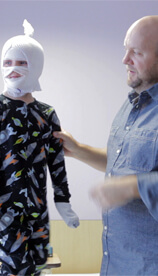New Insights Inspire Treatment and Prevention Strategies for Eczema
Addressing skin-barrier dysfunction and immune polarization
DENVER, CO —
 Recent discoveries about the biological mechanisms of eczema are driving new approaches to treatment and prevention of the disease, according to National Jewish Health Professor of Pediatrics Donald Leung, MD, PhD. In a May 17 review in Current Opinion in Pediatrics, Dr. Leung, a widely recognized authority on research and treatment of eczema, explained how new strategies to maintain the integrity of the skin and to dampen the type 2 allergic response are providing benefits for eczema patients and for those at risk of developing the disease.
Recent discoveries about the biological mechanisms of eczema are driving new approaches to treatment and prevention of the disease, according to National Jewish Health Professor of Pediatrics Donald Leung, MD, PhD. In a May 17 review in Current Opinion in Pediatrics, Dr. Leung, a widely recognized authority on research and treatment of eczema, explained how new strategies to maintain the integrity of the skin and to dampen the type 2 allergic response are providing benefits for eczema patients and for those at risk of developing the disease.
Eczema is characterized by dry, itchy and cracked skin that can exact a profound physical and emotional toll on patients and their families. It commonly begins in infancy and is often followed by food allergies, asthma and hay fever, a progression known as the allergic march.
In the outer layer of the skin a dense, flexible fabric of proteins and lipids forms a physical barrier that protects the body. The breakdown of this skin barrier plays a central role in eczema. Irritants, allergens and microbes penetrate the cracked skin, activate the immune system, and trigger worsening eczema. Protecting the skin barrier with hydration and emollients can help manage eczema and reduce flares.
Recent findings indicate that protecting the skin barrier also can prevent the disease. Skin emollients applied from birth to infants at high risk for eczema reduced incidence by 50 percent.
When irritants, allergens and microbes penetrate the skin, they set off an immune response that provokes inflammation, itching and a weaker skin barrier. The signaling molecules IL-4 and IL-13 are part of this response. They reduce production of proteins and lipids needed to form an effective skin barrier. Experimental medications that block IL-4 and IL-13 have produced remarkable improvements in eczema patients. Approval of at least one of these medications is likely within the year.
The combination of a skin-barrier defect and a systemic immune response also raises the risk of food allergy, and may trigger the entire allergic march of diseases. Several recent research findings indicate that food particles entering the body through cracked skin of young children with eczema triggers an immune response that results in food allergy. People with eczema and/or food allergy are much more likely to develop asthma and hay fever.
Skin emollients to improve the skin barrier and medications to target IL-4 and IL-13 are just part of a multidisciplinary strategy that Dr. Leung recommends to manage atopic dermatitis. Physicians also may prescribe mild bleach baths to reduce bacterial infections of the skin, proactive anti-inflammatory therapy with topical corticosteroids, testing to identify environmental triggers, and even melatonin to address sleep disturbances as elements of a comprehensive strategy to protect the skin, dampen the immune response and improve quality of life.
National Jewish Health is the leading respiratory hospital in the nation. Founded in 1899 as a nonprofit hospital, National Jewish Health today is the only facility in the world dedicated exclusively to groundbreaking medical research and treatment of children and adults with respiratory, cardiac, immune, and related disorders. Patients and families come to National Jewish Health from around the world to receive cutting-edge, comprehensive, coordinated care. To learn more, visit the media resources page.
Media Resources
We have many faculty members, from bench scientists to clinicians, who can speak on almost any aspect of respiratory, immune, cardiac and gastrointestinal disease as well as lung cancer and basic immunology.
Media Contacts
Our team is available to arrange interviews, discuss events and story ideas.
- Adam Dormuth
303.398.1002 office
970.222.5034 mobile
dormutha@njhealth.org - Jessica Berry
303.398.1082 office
303.807.9491 mobile
berryj@njhealth.org
